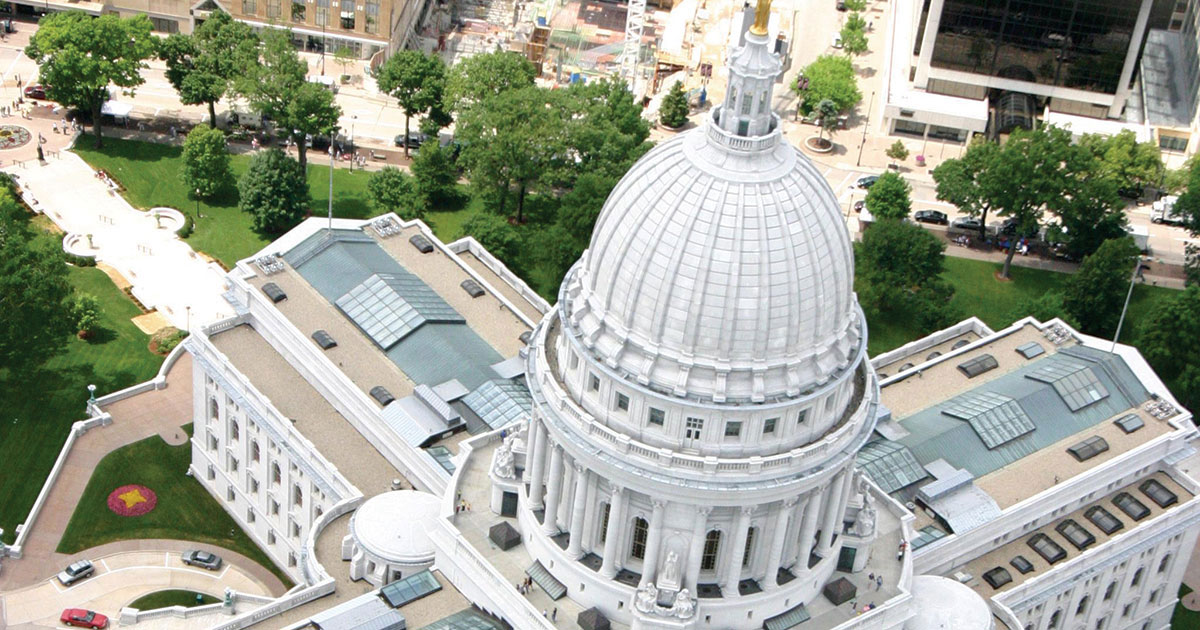
Discussion about Wisconsin politics is almost inescapable these days, whether the headlines are about political infighting, redistricting of the legislative maps, or one of numerous other important issues affecting the state. The 2023-24 session of the Wisconsin Legislature concluded in spring 2024 after a flurry of action in the final months, largely motivated by legislators with new district lines in mind who wanted to wrap up outstanding issues.
Although it may have seemed as though gridlock prevented many bills from passing, from the State Bar of Wisconsin’s perspective, much was accomplished in the waning days of the session. The State Bar’s Government Relations team, bolstered by the support of members and colleagues, achieved many legislative successes. The following is a roundup of what the State Bar and its lobbying sections engaged in during the last 16 months.
Judicial Security Legislation Enacted
Three bills introduced by Sen. Van Wanggaard (R-Racine) and Rep. Ron Tusler (R-Harrison), in collaboration with the Wisconsin court system and with bipartisan support in the legislature, were passed and signed by Governor Tony Evers at the end of March. The State Bar strongly supported the legislative efforts and applauded the legislature’s and the governor’s actions.
 Cale Battles, is a government relations coordinator with the State Bar of Wisconsin. He can be reached by email, or by phone at (608) 250-6077.
Cale Battles, is a government relations coordinator with the State Bar of Wisconsin. He can be reached by email, or by phone at (608) 250-6077.
 Lynne Davis, is a government relations coordinator with the State Bar of Wisconsin. She can be reached by email, or by phone at (608) 250-6045.
Lynne Davis, is a government relations coordinator with the State Bar of Wisconsin. She can be reached by email, or by phone at (608) 250-6045.
 Devin Martin is grassroots outreach coordinator with the State Bar of Wisconsin.
Devin Martin is grassroots outreach coordinator with the State Bar of Wisconsin.
State Bar of Wisconsin President Dean R. Dietrich stated, “We’ve all seen the disturbing increase in violence against judges, their families, and attorneys. From Judge John Roemer to Sara Quirt Sann, the State Bar and its members have faced the worst of situations in our profession. I am thankful to the legislature and the authors for taking this important step.”
2023 Wisconsin Act 234 protects judges by prohibiting picketing or parading protests outside of a judge’s residence and, it is hoped, will provide peace of mind to judges and their families when at home. In addition, 2023 Wisconsin Act 235 allows judges and their immediate family members to opt out of their personal information being publicly distributed, and 2023 Wisconsin Act 236 further addresses judges’ privacy concerns by exempting personal information found in judicial security profiles from public access.
State Bar Lobbying Sections’ Successes
The State Bar has 13 sections that fully participate in the lobbying program. Joining a lobbying section, like all section membership, is completely voluntary. Each section has its own section member-elected board.
The sections also can vote to take reactive positions to support, oppose, or actively monitor legislation that is pending in the legislature. The goal of engagement by sections is to positively affect the process and assist legislators who might be unfamiliar with a subject by explaining the potential effects of policy decisions. These discussions often lead to very positive outcomes either through legislative support and partnerships or by assisting in the drafting of amendments to improve legislation. There are also occasions when sections do not find common ground and oppose legislative efforts.
Business Law
The Business Law Section board supported 2023 Wisconsin Act 246, which adopted modifications to and renamed the Uniform Fraudulent Transfer Act. The act changed the name of Wis. Stat. chapter 242 to the Uniform Voidable Transactions Law and made some minor language modifications to the existing chapter. The Business Law Section is reviewing new Article 12 of the Uniform Commercial Code (UCC) and amendments to the UCC that were approved in 2022.
Real Property, Probate and Trust Law
The Real Property, Probate and Trust Law (RPPT) Section continues to be one of the most active sections in the lobbying program. The RPPT Section supported two legislative efforts that were signed into law in the 2023-24 session. 2023 Wisconsin Act 127 and 2023 Wisconsin Act 130 were both explained in the May Wisconsin Lawyer.1
In addition to supporting those two legislative initiatives, the RPPT Section joined the Family Law Section and the Bankruptcy, Insolvency & Creditors’ Rights Section in opposing Senate Bill 667. That legislation would have created domestic asset protection trusts (DAPTs) in Wisconsin. While the sections did not oppose the DAPT concept, they did oppose the bill as drafted because it would create several issues in these practice areas. The legislation ultimately was vetoed by Governor Evers.2
Sign Up
Stay engaged to help move legislation forward. Learn about the State Bar’s Government Relations program, access the Advocacy Network Grassroots Toolkit, and read the monthly e-newsletter, Rotunda Report.
State Bar Advocacy Network wisbar.org/GovRelations
Rotunda Report wisbar.org/rotundareport
Elder Law and Special Needs
The Elder Law and Special Needs (ELSN) Section continues to work on elder abuse issues. The ELSN Section supported an amended version of 2023 Wisconsin Act 132, which ELSN Section members thought better addressed issues of elder abuse with more focused tools for financial institutions to communicate with consumers’ “trusted contacts.” The ELSN Section also successfully opposed changes that would have been made by Assembly Bill 1088, which would have circumvented the adult guardianship process for admission of patients to certain long-term care facilities. The section supported the establishment of ABLE accounts in Wisconsin, and Governor Evers signed the legislation, 2023 Wisconsin Act 267, in early April.
Bankruptcy, Insolvency & Creditors’ Rights
In addition to opposing SB 667, the Bankruptcy, Insolvency & Creditors’ Rights Section joined the Public Interest Law Section in monitoring changes to Assembly Bill 337, which would have eliminated the 13-week limit on wage garnishment. The legislation passed the Assembly but failed to receive a vote in the Senate.
Taxation Law
The Taxation Law Section supported two legislative proposals this session. 2023 Wisconsin Act 36 adopted changes to the Internal Revenue Code (I.R.C.). The Taxation Section was particularly interested in correcting changes in I.R.C. § 1202. The section also supported Assembly Bill 1089, regarding interest rates on late, nondelinquent taxes and on overpayments. This legislation passed both houses but was vetoed by Governor Evers3 because of concerns about the bill’s fiscal impacts.
Children & the Law
The Children & the Law Section board was very active this session. Board members supported 2023 Wisconsin Act 118, allowing for virtual preadoption training courses, and continued their efforts to pursue so-called safe-harbor legislation (banning prosecution or delinquency adjudication of minors for committing acts of prostitution) in Wisconsin by supporting Senate Bill 55 and Assembly Bill 48. Although the legislation, as in previous sessions, did not become law, the board continues to demonstrate its support by testifying at public hearings. Throughout the session, the section board was asked to consult on numerous legislative proposals. The board’s feedback contributed to some proposals not coming to fruition; other proposals are currently in the works for the 2025-26 session. These results demonstrate the significance that legislators place on board members’ knowledge, experience, and input.
Family Law
As noted above, near the end of the session the Family Law Section board participated in advocacy regarding Senate Bill 667, involving domestic asset protection trusts. The board will continue to identify how DAPTs might affect the practice of family law. In addition, the board shared concerns about unintended, and possibly adverse, consequences on children and families of Assembly Bill 510 (which would have established a new legal standard for infringement relating to certain rights of parents and guardians) if the bill had become law. Governor Evers vetoed the bill in March.4 The board continues to discuss matters that section members encounter in their daily practices that they believe should be addressed in statutes and will seek introduction of related legislation in the upcoming session.
Criminal Law
Similar to other section boards, the Criminal Law Section board was asked numerous times during the 2023-24 session for input on legislative ideas and remedies. Sometimes the board members’ thoughtful feedback resulted in better legislation; other times, legislators decided to abandon proposals based on the board’s identification of negative or unintended consequences.
In addition to providing their views on legislative proposals, the board also advocated for the passage of 2023 Wisconsin Act 61, closing a loophole in the definition of sexual contact; and voiced concerns about Senate Bill 106 and Assembly Bill 58, involving mandatory minimums for felons in possession of a firearm, and Senate Bill 404 and Assembly Bill 421, which would have increased penalties for individuals operating motor vehicles with a suspended or revoked license, neither of which passed the legislature.
Civil Rights & Liberties
The Civil Rights & Liberties Section board remained steadfast in opposition to legislation prohibiting transgender female athletes from participating in sports designated for women: Assembly Bill 377 (K-12 schools) and Assembly Bill 378 (University of Wisconsin institutions and technical colleges). Board members testified at all public hearings on these bills, and while Assembly Bill 378 did not pass the legislature, Assembly Bill 377 did pass but was vetoed by Governor Evers in April.5 The board also expressed concerns about the effects of Senate Bill 517 on victims’ rights, judicial discretion, and ex parte communication between prosecutors and judges. Governor Evers vetoed this legislation in April.6
Construction Law
The Construction Law Section board supported Senate Bill 270, which established a compensation process for costs incurred as a result of utility-relocation delays. This legislation was signed into law in 2023 as 2023 Wisconsin Act 46.
Early Session Budget Victories
Also worth highlighting are successes for the State Bar and the state’s justice partners that occurred earlier in the session. Notably, the following were included in the 2023-25 state budget:
Increasing the starting pay for new assistant district attorneys and state public defenders to $36 per hour;
Approving salary adjustments and pay progression for assistant district attorneys and state public defenders by $8.76 per hour;
Raising the private bar rate to $100 per hour with an increase in travel reimbursement to $50; and
Funding for four additional circuit court branches and funding for cybersecurity initiatives for the court.
Conclusion
The success of the State Bar and its lobbying sections’ legislative advocacy is due in large part to the volunteer efforts of members. The time that attorneys took to craft initiatives, draft position papers, and testify at public hearings had a significant effect. In addition, because there are few lawyer-legislators, elected officials often seek the input and advice of State Bar members, knowing they have an intimate knowledge of the real-world effects on Wisconsin residents of legislation involving the justice system. Lawmakers appreciate the time members take to provide that feedback.
The most important voices for legislators are those of their constituents. The impact of an educated voter contacting a legislator’s office to express support for or opposition to a bill cannot be overstated. The State Bar’s Grassroots Advocacy Network makes that process quick and easy. To engage, visit wisbar.org/govrelations and follow the prompts.
Thanks to all State Bar members who participate in the advocacy program and helped to achieve this long list of legislative accomplishments. We look forward to seeing outreach efforts continue to grow in the next legislative session.
Endnotes
1 Mark A. Shiller, Wisconsin Trust Code Trailer Bill, 97 Wis. Law. 18-22 (May 2024) & Catherine M. Priebe & Phillip J. Miller, Remote Winessing and Notarization of Estate Planning Documents, 97 Wis. Law. 24-28 (May 2024).
2 https://content.govdelivery.com/attachments/WIGOV/2024/03/29/file_attachments/2831169/SB 667 Veto Message for Signature.pdf.
3 https://content.govdelivery.com/attachments/WIGOV/2024/03/29/file_attachments/2831137/AB 1089 Veto Message for Signature.pdf.
4 https://docs.legis.wisconsin.gov/2023/related/veto_messages/ab510.pdf.
5 https://content.govdelivery.com/attachments/WIGOV/2024/04/02/file_attachments/2833681/Signed Veto Message - AB 377.pdf.
6 https://content.govdelivery.com/attachments/WIGOV/2024/03/29/file_attachments/2831165/SB 517 Veto Message for Signature.pdf.
» Cite this article: 97 Wis. Law. 55-57 (June 2024).
